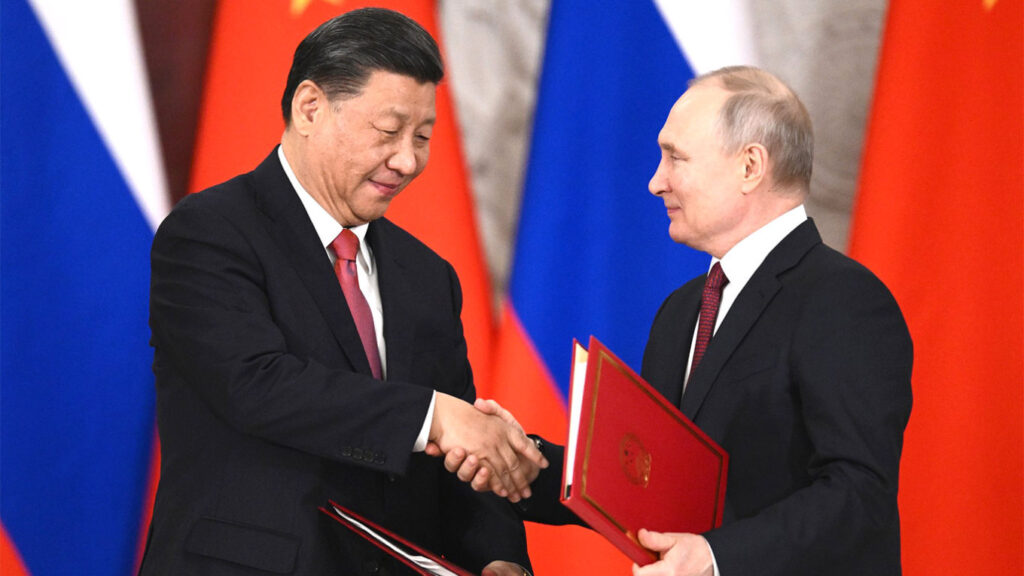
Putin-Jinping-kremlin.ru-RIA Novosti
STRATEGIC ASSESSMENT. U.S. Secretary of State Antony Blinken voiced skepticism over Chinese President Xi Jinping’s “peace” proposals in Moscow, warning they could be a “stalling tactic” to help Russia on the ground in Ukraine.
He said the United States welcomed any diplomacy for a “just and durable peace” but raised doubts that China was safeguarding the “sovereignty and territorial integrity” of Ukraine.
Blinken said that any plan to end the war must uphold Ukraine’s sovereignty and territorial integrity in accordance with the U.N. Charter. Blinken also stated that Xi’s three-day trip to Moscow demonstrates that Beijing “considers it irresponsible to hold the Kremlin accountable for the atrocities committed in Ukraine.”
“China and the United States can and should work together,” Li Qiang said emphatically. After Xi Jinping, who returned to lead China for a third term, he is currently expected to take over as the country’s number two leader.
In his first press conference as China’s Premier following his inauguration at the 14th Chinese National People’s Congress, Li Qiang responded to inquiries regarding the direction of Sino-American economic ties.
China and the United States need and benefit from each other, he said, despite recent hot issues in the media about the decoupling of U.S. companies from China. “However, I wonder how many people actually benefit from such a fuss?” said Li.
Spy balloons over the American Midwest, warnings from Beijing of a clash if Washington “doesn’t hit the brakes” and intense congressional scrutiny of investment in China — there could hardly be a less auspicious time for US business to attend Beijing’s flagship investment conference.
But this weekend, former secretary of state Henry Kissinger, investor Ray Dalio and American business chiefs including Jon Moeller of Procter & Gamble will head to Beijing for what has been billed as an opening-up party after three years of a strict zero-Covid policy.
Many of the business figures attending the China Development Forum will be seeing their mainland operations and meeting Beijing officials for the first time in three years. But while the Davos-like event is focused on “opportunities and co-operation” as the Chinese economy rebounds from the pandemic, the headwinds facing US business interests in China are also coming from Washington.
As Russian President Vladimir Putin confers with China’s President Xi Jinping in Moscow, the visit signifies more than a celebration of the so-called “no limits” partnership between the two powers.
It’s also a pivotal meeting poised to deepen the gap between the East and West, and just the latest in a series of stress tests on the relationship between Beijing and Washington — one already pushed to a near-breaking point.
Even though Biden administration officials anticipated Xi would journey to Moscow, they still describe the summit as a setback for the U.S.-China relationship and say they’ll be watching the visit closely to see if Beijing intends to supply Moscow with military aid — a potentially game-changing development for the war in Ukraine, and one that could bring the simmering tensions between the U.S. and China to a boil.
The Chinese government is increasing its efforts to promote peace. After contributing to the improvement of relations between Saudi Arabia and Iran, it is now focusing on the conflict between Russia and Ukraine.
Regarding the mission, which was announced, Chinese President Xi Jinping will travel to Russia from March 20 to 22 to meet with his Russian counterpart, Vladimir Putin. Wang Wenbin, a spokesperson for the Chinese Foreign Affairs Ministry, said that this was Xi’s first visit to Russia in four years. The purpose of this visit includes promoting peace.
The United States accused China and Russia on Monday of shielding North Korea from any action by the U.N. Security Council for its unprecedented spate of intercontinental ballistic missile launches, which violate multiple U.N. resolutions and jeopardize international aviation and maritime safety.
U.S. Ambassador Linda Thomas-Greenfield told a council meeting that Chinese and Russian “obstructionism” was encouraging North Korea “to launch ballistic missiles with impunity” and advance its development of more sophisticated and dangerous weapons.
China’s ability to move quickly on military sales is costing the United States in two key regions and could have even more dire consequences in the years to come, top U.S. military officers are warning lawmakers.
The blunt assessments from the commanders of U.S. Central Command, which oversees American forces in the Middle East and South Asia, and from U.S. Africa Command come as a growing number of defense officials voice concerns about the rapid military modernization that has already made China the Pentagon’s “pacing challenge.”
“This is a race to integrate before China can penetrate,” Central Command’s General Michael Kurilla told members of the Senate Armed Services Committee, pointing to an 80% increase in Chinese military sales to the region over the past 10 years.
Intensified spying by American drones near Ukraine could lead to an escalation and Russia will respond proportionally to future intelligence-gathering operations, Moscow’s defence chief has told his US counterpart.
The comments came in a phone conversation between Sergei Shoigu and Pentagon boss Lloyd Austin after the United States accused a Russian Su-27 fighter jet of colliding with one of its Reaper surveillance drones, forcing it to crash into the Black Sea.
In a matter of days, Saudi Arabia carried out blockbuster agreements with the world’s two leading powers — China and the United States. Riyadh signed a Chinese-facilitated deal aimed at restoring diplomatic ties with its arch-nemesis Iran and then announced a massive contract to buy commercial planes from U.S. manufacturer Boeing.
The two announcements spurred speculation that the Saudis were laying their marker as a dominant economic and geopolitical force with the flexibility to play Beijing and Washington off each other.
But as the Biden administration takes stock of the moment, officials are pushing back against the notion that the developments amount to a shift in the dynamics of the U.S.-China competition in the Middle East.
Russia said that it would try to retrieve the remnants of a US drone that crashed into the Black Sea. The large MQ-9 Reaper drone plunged into the water. Speaking on state television, Russian security council secretary Nikolai Patrushev confirmed Moscow was attempting to find the aircraft.
“I don’t know whether we’ll be able to retrieve it or not but it has to be done,” Mr Patrushev said. He also said that the drone’s presence in the Black Sea was “confirmation” that the US was directly involved in the war.
The détente China brokered between Iran and Saudi Arabia is spurring breathless talk in some corners of a regional paradigm shift and even the rise of a Beijing-centric world order. The Biden administration’s reaction, however, amounts to: Nothing to see here, folks.
U.S. officials have issued brief public statements that downplay the initiative. Asked for details in interviews, they argued that, among other things: It’s a one-off case; it was in China’s economic interest to broker the deal; it doesn’t translate into long-term alliances; and anything that helps calm the region is in America’s interest.
The U.S. has begun an aggressive new push to inflict pain on Russia’s economy and specifically its oligarchs with the intent of thwarting the Kremlin’s invasion of Ukraine.
From the Treasury Department to the Justice Department, U.S. officials will focus on efforts to legally liquidate the property of Russian oligarchs, expand financial penalties on those who facilitate the evasion of sanctions, and close loopholes in the law that allow oligarchs to use shell companies to move through the U.S. financial system.
“These illicit procurement networks will continue to take up an ever-increasing amount of our bandwidth,” said Adams, who also serves as acting deputy assistant attorney general. So far, more than $58 billion worth of sanctioned Russians’ assets have been blocked or frozen worldwide, according to a report last week from the Treasury Department.
Americans’ already-negative opinions of Russia have soured further in the past year, dropping from 15% holding a favorable view to 9%. The current reading for Russia is the lowest Gallup has measured since it first asked about the “Soviet Union” in this format in 1989.
Russia is now the fourth country in Gallup’s polling of country favorable ratings to register a sub-10% favorable score. Iran, Iraq and North Korea have had ratings below 10% on multiple occasions. The all-time low favorable rating for any country was 3% for Iraq in 1991 during the Persian Gulf War.
The Pentagon made its largest-ever budget request on Monday, citing China as a “pacing challenge”. The 2024 budget called on Congress to provide US$842 billion in defence spending, marking a 3.2 per cent increase over 2023 and a 13.4 per cent increase over 2022. The announcement came a week after China presented a military budget of $230 billion, a 7.6 per cent jump from last year.
US Defence Secretary Lloyd Austin said in a statement that the budget would allow the Pentagon to “invest in capabilities that will ensure we maintain a ready, lethal, and combat-credible joint force with a laser focus on China as the department’s pacing challenge and addressing the acute threat posed by Russia”.





